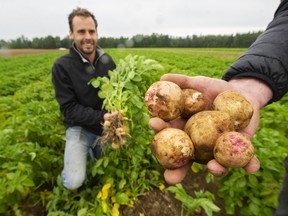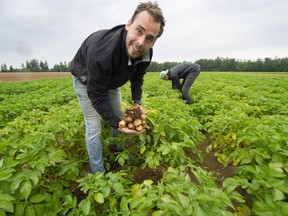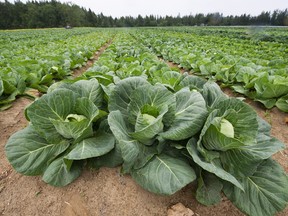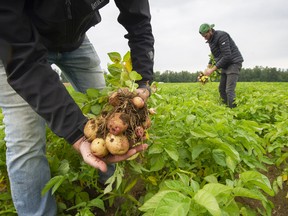Article content
A Surrey field that last year produced 70 per cent of B.C.’s potato crop could be added to the agricultural land reserve to save it from industrial development.

More than 75,000 people signed an online petition to protect the Campbell Heights property, which does not fall within B.C.’s agriculture land reserve.

A Surrey field that last year produced 70 per cent of B.C.’s potato crop could be added to the agricultural land reserve to save it from industrial development.
The Agricultural Land Commission has planned a public hearing for Jan. 23 to consider the future of the Campbell Heights property after farmers sounded the alarm over its uncertain future.
“This is a matter that affects all of us, since we all eat food,” said Tristin Bouwman, crop manager with Heppell’s Potatoes. “It’s about having a reliable food supply.”
The 89-hectare — just under a square kilometre — field at 192nd Street and 36th Avenue is about two-thirds of a property owned by the federal government and has been leased by Heppell’s for the last 50 years. It produces between 30 million and 50 million servings of vegetables each year, which in early spring and late fall are often the only locally grown field veggies available in B.C. grocery stores.
That is because of several characteristics that make the property unique.
Used by the federal government as a radar site during the Second World War, the land is elevated and sandy. It drains very well, allowing farmers to plant and harvest when conditions are rainy and wet. While Surrey and Delta experience slightly higher temperatures and more hours of sunshine than nearby cities like Abbotsford and Chilliwack, their soil is typically heavier and harder to work in rainy months.
“This piece has that right balance of sunshine, temperatures and drainage,” said Bouwman.
During last year’s abnormally cold and wet spring, Heppell’s were able to plant and harvest potatoes before other farmers were able to get onto their muddy fields to cultivate them. As result, the field produced several crops of potatoes, about 70 per cent of B.C.’s domestic harvest, as well as the first local parsnips, carrots and cabbage.

The inclusion of the entire property in the agricultural land reserve was initiated by the commission, which is accepting written submissions on the matter.
The property is managed by Innovation, Science and Economic Development Canada, which declared it surplus to program requirements in 2016. It is expected that Public Services and Procurement Canada will solicit expressions of interest from federal departments, Crown corporations, provinces, municipalities and Indigenous groups before offering it for sale.
In the early 2000s, the property was included in the City of Surrey’s Campbell Heights plan as a potential opportunity for a business park “in an effort to address the increasing demand and limited supply of employment lands in the region,” according to a previous city statement.
Last spring, after advocacy by local farmers and a Postmedia story about the field, Surrey council passed a motion supporting inclusion of the land in the reserve.
“We believe that preserving and protecting these lands is essential for the local community and the entire province,” said Surrey Coun. Mandeep Nagra, who was a member of the previous council.
He urged residents to attend the public hearing or send a written submission indicating their support for including the land in the reserve.


The Agricultural Land Commission’s director of operations, Avtar Sundher, said he couldn’t comment on the case before it goes to a public hearing, but he noted that exclusion applications are more common than inclusions in the reserve.
The commission’s annual report listed seven inclusion applications across B.C. from April 2021 to 2022, including one in the South Coast region. All seven were approved.
In comparison, there were 28 exclusion applications, including nine in the South Coast region, with 15 refusals and 13 approvals. Three exclusion applications in the South Coast region were approved.
Bouwman said that while 75,000 people signed an online petition to protect the farmland, he anticipates some opposition to including it in the Agricultural Land Reserve.
“There is a land scarcity in B.C. Everyone would love to have more,” he said.
Last April, the vacancy rate for warehouse space in Vancouver fell below one per cent, according to data from real estate adviser Altus Group. Overall leasing costs for industrial real estate have increased 40 per cent in Vancouver in three years to an average of about $17.40 per square foot, with some companies sending goods to Calgary for storage after arrival at the port, then shipping them back again when needed.
But Bouwman said that as climate change and supply chain issues challenge the availability of imported food, B.C. needs to protect its ability to feed itself. “We’re deeply humbled by the public support to continue to farm this land.”



— with Postmedia files
Source: vancouversun.com